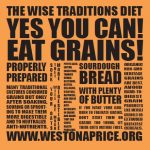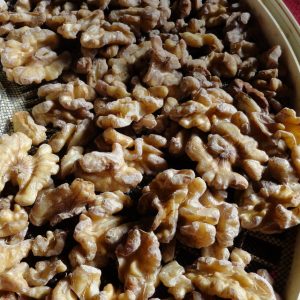 Properly prepared grains, legumes, nuts and seeds can be part of a healthy diet. We encourage the proper preparation of grain, nuts, seeds and legumes to reduce “anti-nutrients”, and to improve digestibility. Many people who previously had difficulties with grains find that they can consume them when they have been properly prepared (some people have to work on their digestion before they they are able to tolerate grains).
Properly prepared grains, legumes, nuts and seeds can be part of a healthy diet. We encourage the proper preparation of grain, nuts, seeds and legumes to reduce “anti-nutrients”, and to improve digestibility. Many people who previously had difficulties with grains find that they can consume them when they have been properly prepared (some people have to work on their digestion before they they are able to tolerate grains).
All grains, nuts, seeds and legumes need proper preparation. Gluten containing grains (such as wheat and rye), gluten-free grains (such as rice, and corn), as well as nuts, and seeds that are used in place of grains (such as quinoa, amaranth, and teff) all need careful preparation in order to maximize nutrition.
About Grains, Legumes & Nuts (from Healthy 4 Life):
Grains, legumes and nuts are seeds of plants that human beings consume for food. Grains include wheat, barley, rye, oats, rice and corn; legumes are seeds that come in pods, such as black beans, kidney beans, lima beans, chickpeas, lentils, peanuts and cashews; nuts include walnuts, pecans, almonds, hazelnuts and pistachios. These kinds of foods add variety and interest to the diet. They are a source of many nutrients, including B vitamins, minerals and special types of fats.
However, all seeds contain what scientists refer to as “anti-nutrients,” substances that block the uptake of minerals, block digestion and irritate the intestinal tract. In traditional cultures all over the world, grains are very carefully prepared to lower the levels of these compounds to make grains, legumes and nuts easier to digest. These preparation techniques include roasting, long soaking of beans following by cooking, soaking grains in slightly acidic water, followed by cooking, and fermenting bread dough to make sourdough bread.
Read more >> Download Healthy 4 Life

Proper Preparation:
Traditional people took great care with preparation of grains. Grains, nuts, seeds and legumes need to be prepared by soaking, sprouting, or sour leavening before cooking in order to neutralize the anti-nutrients naturally occurring in these foods.
The fragile oils in grains, nuts, & seeds easily go rancid, so we recommend freshly grinding flour whenever possible.
We recommend learning to properly prepare grains, legumes & nuts by reading Nourishing Traditions, Healthy 4 Life, and attending our Classes.
Your Chapter Leader says “I like to soak and dry batches of seeds or nuts and keep them in jars in the refrigerator. I try to always have on hand: crispy walnuts, cashews, pecans, almonds and sunflower seeds. Sometimes I also have buckwheat and pumpkin seeds. I keep flax seeds in the fridge and grind a small amount in my coffee grinder when needed.”
See also: Crispy Nuts & Seeds
Local Sources:
Here in the Willamette Valley we have an excellent climate for growing beans and grains. Historically they were grown in the area, and there is a recent movement to bring growing these crops back to the valley. We also have a number of local walnut and hazelnut producers.
For sources please see: Find Nutrient-Dense Foods
The Southern Willamette Valley Bean and Grain Valley Project:
Camas Country Mill is a local mill, grinding fresh flour from local grains.
Local beans and grains can be found at:
- Hummingbird Wholesale
150 Shelton McMurphey Blvd. Suite 104, Eugene, OR 97401
(541) 686-0921 (Open to the Public): 10am—2pm, Tue and Thu only
- Eugene area Natural Food Stores
* Once you understand the principles of proper grain preparation, many recipes can easily be modified, until then please note that we do not endorse the recipes listed on some of the above sites.
Sourdough:
- Local Sourdough Bakeries (Eugene area)
Articles on the Weston A. Price Foundation website:
- FAQ-Grains, Seeds, Nuts, Beans
- Be Kind to Your Grains…And Your Grains Will Be Kind To You
- Living With Phytic Acid
- Gluten-Free Sourdough Starters, Pancakes and Muffins
- Sourdough Egg Noodles
- Sourdough Rye Bread
- Against the Grain
- Going with the Grain
- Our Daily Bread
- Gluten-Free Sourdough Starters, Pancakes and Muffins
- Sweet Sourdough Bread. . .
- Health Benefits from Sourdough
- Sourdough Einkorn Pancakes
- Sourdough Bagels
- Yes We Can
- To Gluten or Not to Gluten?
- Wheaty Indiscretions: What Happens to Wheat, from Seed to Storage
- Should we eat grains? (Principle #6)
- Breads & Flour Products – recipes
- Easy Sourdough Bread – recipe
- Homemade Granola – recipe
- More food articles in Food Features
Gluten-Free or Grain-free:
Videos:
- Proper Preparation of Grains and Legumes Video by Sarah Pope
- What’s With Wheat? – Thumbs Up Review


